
ctDNA reductions or clearance also appeared to correlate with a decrease in disease burden during the pre-boost phase of radiotherapy.

Your AI-Trained Oncology Knowledge Connection!


ctDNA reductions or clearance also appeared to correlate with a decrease in disease burden during the pre-boost phase of radiotherapy.

Investigators evaluated ctDNA as a potentially noninvasive method to predict response to radiotherapy among those with gynecologic malignancies.
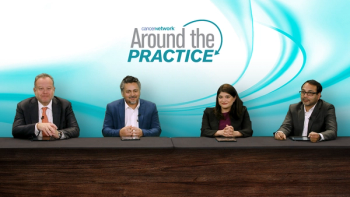
Panelists discuss how the current treatment landscape for relapsed/refractory multiple myeloma (R/R MM) includes standard options like such as IMiDs, PIs, and mAbs, while highlighting the emergence of novel therapies such as CAR T- cells and bispecific antibodies, which address unmet needs and offer potential advantages in treatment efficacy and patient outcomes.
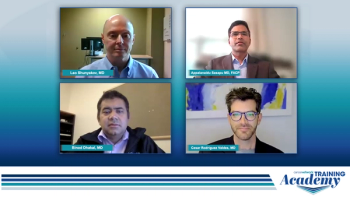
Panelists discuss how patient-specific factors such as disease status, overall health, support systems, and treatment history are crucial considerations when determining readiness for potential transition to community settings for ongoing care.

Panelists discuss how cytokine release syndrome and neurological toxicities have been the most challenging adverse events to manage with GPRC5D-targeted therapies, requiring proactive monitoring and intervention strategies, while noting that these side effects are generally similar to those seen with other bispecifics.

Panelists discuss how cytokine release syndrome and neurological toxicities have been the most prevalent safety concerns in community settings when using bispecific therapies, requiring careful monitoring and management strategies.
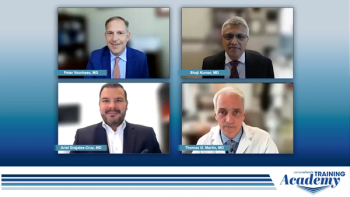
Following the presentation of a case of a patient with relapsed/refractory multiple myeloma, the expert panel reviews treatment options.

Following the review of a case of a patient with relapsed/refractory multiple myeloma, the panel provides expert perspectives on adverse event management practices.

Shaji Kumar, MD, reviews data from cohort C of CARTITUDE-2 and a real-world study evaluating ide-cel in patients with relapsed/refractory multiple myeloma.
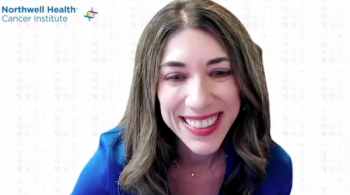
Study findings reveal that patients with breast cancer reported overall improvement in their experience when receiving reflexology plus radiotherapy.

Panelists discuss how the initial process of identifying and referring potential candidates for bispecific therapy from the community setting to an academic center involves careful patient assessment, clear communication channels, and established referral protocols to ensure timely and appropriate treatment initiation.
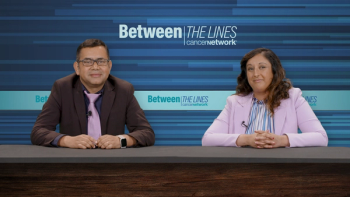
Panelists discuss how the CARTITUDE-4 study data provide a comprehensive overview of its design, baseline characteristics, and efficacy outcomes, highlighting the potential of ciltacabtagene autoleucel in improving treatment results for patients with lenalidomide-refractory multiple myeloma.

Patients undergoing radiotherapy for breast cancer were offered 15-minute nurse-led reflexology sessions to increase energy and reduce stress and pain.
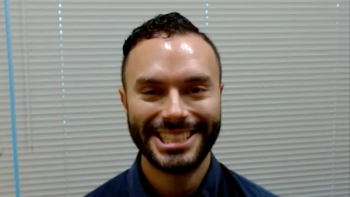
Raymond B. Mailhot, MD, MPH, discussed how radiation therapy can impact education and survivorship for pediatric survivors of brain tumors.

Significant results from a retrospective analysis of brain tumor survivor academic performance after radiotherapy emerged despite small sampling size.
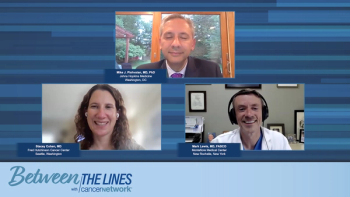
Panelists discuss how circulating tumor DNA (ctDNA) is revolutionizing colorectal cancer (CRC) management by enabling more personalized and precise approaches to diagnosis, treatment selection, and monitoring of disease progression.

Panelists discuss how colorectal cancer rates are increasing, particularly among younger adults, while highlighting the potential of circulating tumor DNA (ctDNA) technology to improve early detection and treatment monitoring.
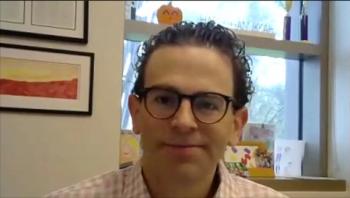
Findings may help providers and patients with head and neck cancer consider whether to proceed with radiotherapy modalities, such as proton therapy or IMRT.

Raymond B. Mailhot, MD, MPH, discussed methods for comparing academic performances of patients following radiation therapy with healthy control groups.
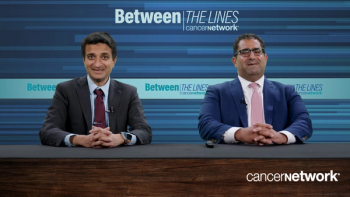
Panelists discuss how they implement prophylactic strategies for treatment-related adverse events in the MARIPOSA study and how they counsel patients about managing these effects.
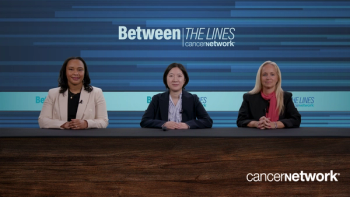
Panelists discuss the clinical implications of the SKIPPirr trial data presented at the 2024 World Congress on Lung Cancer, including whether it might reduce resistance to using this combination in practice, how to implement supportive measures such as prophylactic dexamethasone 8 mg, potential barriers to implementation, strategies to overcome these barriers, and ways to educate patients about infusion-related reactions and the benefits of prophylactic measures.

Study results appear to affirm anecdotal information from patients with head and neck cancer related to taste changes during and after radiotherapy.

Noah S. Kalman, MD, MBA, describes the rationale for using a test to measure granular details of taste change in patients undergoing radiotherapy for HNC.

No evidence indicates synergistic toxicity when combining radiation with CAR T-cell therapy in this population, according to Timothy Robinson, MD, PhD.

The addition of radiotherapy to CAR T-cell therapy may particularly benefit patients with localized disease, according to Timothy Robinson, MD, PhD.

Timothy Robinson, MD, PhD, discusses how radiation may play a role as bridging therapy to CAR T-cell therapy for patients with relapsed/refractory DLBCL.

Panelists discuss how chimeric antigen receptor (CAR) -T-cell therapy has transformed the treatment landscape for relapsed/refractory multiple myeloma (R/R MM), demonstrating remarkable efficacy and offering new hope for patients with limited therapeutic options.

Panelists discuss how GPRC5D-targeted bispecifics are likely to be incorporated earlier in treatment sequencing for multiple myeloma in the future, while considering factors such as optimal timing, potential combinations with other therapies, sequencing strategies, and possible drug interactions when integrating these treatments into the overall management of relapsed/refractory multiple myeloma patients.

Panelists discuss how multiple myeloma care faces challenges including patient reluctance to seek treatment at academic centers, complex treatment landscapes, and the need for improved coordination between community and academic physicians.

Experts on multiple myeloma address the intricacies of adverse event management practices, focusing on taste changes and associated weight loss.